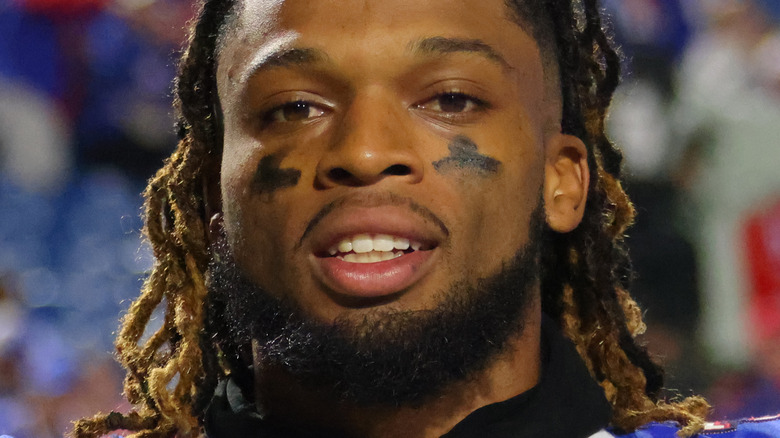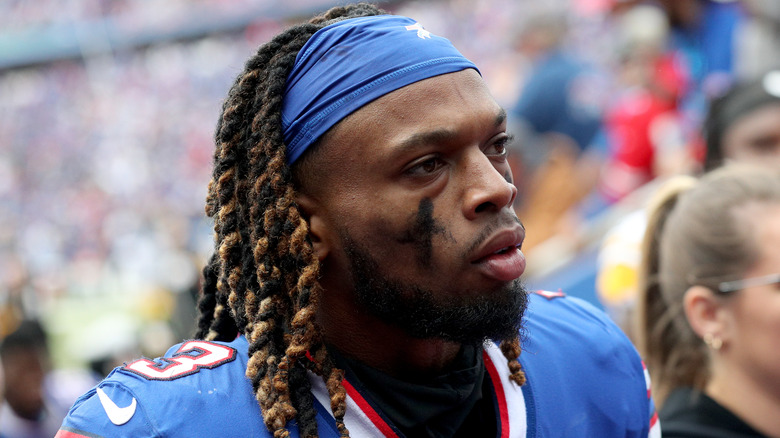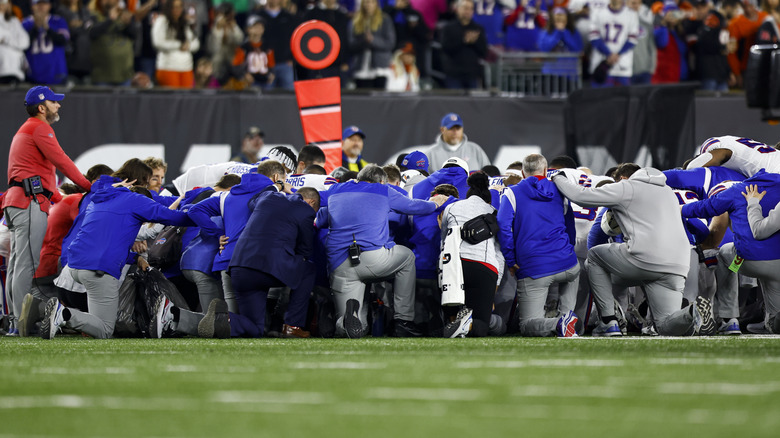The NFL's Handling Of Damar Hamlin Medical Emergency Was No Easy Decision - Exclusive
Damar Hamlin went into cardiac arrest on January 2, after tackling Tee Higgins during a game between the Buffalo Bills and the Cincinnati Bengals, per CBS Sports. Medical professionals performed CPR on Hamlin for several minutes before sending him to the hospital, per CNBC. While there have been several updates over the past few days, as of writing time, Hamlin is still in critical condition and currently on a ventilator, per CNN. Thankfully, as Hamlin's uncle notes, it appears "he's trending upwards in a positive way."
As fans anxiously await Hamlin's fate, they've directed their negative emotions towards the NFL's handling of the game. Following Hamlin's medical emergency, there have been conflicting reports about how long it took the NFL to postpone the game between the Bills and Bengals. According to Mediate, players were only allowed five minutes to get themselves together after witnessing their teammate and peer collapse. However, the NFL has since denied these claims. Ultimately, they did cancel the game shortly after Hamlin was transported to the hospital. As of January 3, the NFL hasn't set a concrete date for the Bulls and Bengals to match up again, per a Twitter statement. And while some fans have continued to rally around Hamlin amid his unprecedented health scare, we spoke to Dr. Shaun Fletcher, Professor of PR & Sport Communications at San Jose State University, to get some insight on just how a difficult a decision the league had to make.
Protocol and decision-making can be 'layered'
According to Dr. Shaun Fletcher, the NFL "justifiably tends to face criticism when it comes to prioritizing player health and safety." However, he acknowledges the efficacy of their "injury response protocol." As noted by Dr. Fletcher, the first responders who treated Damar Hamlin are required by the NFL to attend every game, although they're rarely actually needed. "In these situations, protocol and decision-making can be quite layered." When it comes to making the initial decisions, the coaches and field officials make the first calls before seeking intervention from the league office. Fletcher spoke further about the league's response time, saying, "While the NFL tends to exude a position of omnipresence, they learn many things shortly before the viewing audience. The immediate condition of Damar was playing out in real time to league officials as well as the viewing TV audience ... No substantive information is being relayed to the commissioners office at the time beyond general actions being taken on the scene."
Dr. Fletcher continued, "Speaking from firsthand experience, the flow of information doesn't move as quickly as many believe with a large operation such as the NFL. That doesn't necessarily mean that the NFL mishandled critical decisions. Ultimately, the correct decision was made to postpone the game and allow the players to leave." Ultimately, he finds "much of the external criticism to be unfounded."
Damar Hamlin's accident puts a spotlight on the mental health of athletes
Following Damar Hamlin's medical emergency, a video of his teammates looking visibly distraught started to make rounds on social media. Their disposition has set off a conversation about how Hamlin's unfortunate event has impacted the athletes' mental health. "I hope there are mental health services in place for both the Bills and Bengals players," tweeted writer Devin Jackson. "They witnessed a traumatic incident on that field tonight that they'll never forget. This is a time for the NFL to step up and truly show they care about player safety and wellness."
Dr. Shaun Fletcher also believes that the extremity of Hamlin's injury underscores the importance of providing mental health services to players. "Professional athletes are often required to compartmentalize all aspects of themselves in order to be mentally available to perform at the highest level of play," said Dr. Fletcher. "The severity of the trauma suffered by Damar Hamlin penetrated those mechanisms and ability to compartmentalize emotions." However, he noted, "On-the-field trauma has rarely risen to the level of players suffering mental anguish that impacts their ability to perform the remainder of the game. It's usually trauma related to off-the-field events that impacts on-field performance."
And while the NFL recently sent players a memo listing an abundance of mental health resources, Dr. Fletcher concluded his thoughts by saying he "would like to see more."



